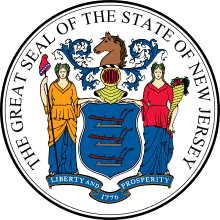A. Harry Moore
| Arthur Harry Moore | |
|---|---|
 | |
| 39th Governor of New Jersey | |
|
In office January 19, 1926 – January 15, 1929 | |
| Preceded by | George Sebastian Silzer |
| Succeeded by | Morgan Foster Larson |
|
In office January 19, 1932 – January 3, 1935 | |
| Preceded by |
Morgan Foster Larson Governor |
| Succeeded by |
Clifford Ross Powell Acting Governor |
|
In office January 18, 1938 – January 21, 1941 | |
| Preceded by | Harold G. Hoffman |
| Succeeded by | Charles Edison |
| United States Senator from New Jersey | |
|
In office January 3, 1935 – January 17, 1938 | |
| Preceded by | Hamilton Fish Kean |
| Succeeded by | John G. Milton |
| Personal details | |
| Born |
July 3, 1877 Jersey City, New Jersey |
| Died |
November 18, 1952 (aged 75) Branchburg Township, New Jersey |
| Political party | Democratic |
| Spouse(s) | Jennie Hastings Stevens |
| Religion | Christian Reform |
| Signature |
|
Arthur Harry Moore (July 3, 1877 – November 18, 1952) was a Democrat who was the 39th Governor of New Jersey, serving three terms between 1926 and 1941. He was the longest-serving New Jersey Governor in the 20th century and the only New Jersey Governor elected to serve three separate non-consecutive terms. Moore represented New Jersey in the United States Senate from January 3, 1935, to January 17, 1938, when he stepped down to begin his third term as Governor of New Jersey.
Biography
He was born in Jersey City, New Jersey on July 3, 1877, and attended public schools. He graduated from Cooper Union in New York City. Moore later graduated from the New Jersey Law School at Newark (now a part of Rutgers University) and was admitted to the bar in 1922, commencing practice in Jersey City.
Moore died on November 18, 1952 at the age of 75, in Branchburg Township, New Jersey when he suffered a stroke while driving with his wife and ran his car off the highway. His wife was only slightly injured in the crash. He was buried at New York Bay Cemetery in Jersey City.
Political career
As governor, Moore attained national prominence when he took charge of the investigation into the Lindbergh kidnapping in 1932. After retiring as governor, Moore resumed his legal practice in Jersey City. See alsoExternal links
| |||||||||||||||||||||||||||||||||

